英语统考B 介绍
大学英语B级考试介绍ppt课件
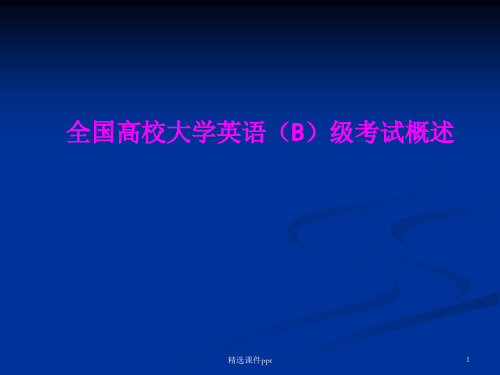
精选课件ppt
20
56. What product is inquired about in the first letter? The latest model of ____________________.
精选课件ppt
21
(二)试卷结构与题型 共20分
项 内 题 考 题 每题 总 目 容 型 点 量 分数 分
精选课件ppt
23
65. Thank you, Mr. Black. It’s a great honor to be appointed as Overseas Sales Manager. To be honest, this promotion came as quite a surprise to me. I’d like to think it’s mainly the contribution of the whole team. I’d like to thank all my colleagues in the company for their support and hard work. Due to their efforts, we’ve started some overseas projects successfully. Looking to the future, I’d still like to maintain contact with everyone, even though I’ll be working at the management level.
2篇短文, 多 理解主旨
阅 包括应用文、项 要义、具 10 2 20
读 T1 描述文、记 选 体信息, 个
理 / 叙文、说明 择 根据上下 题
统考英语b作文模板及范文
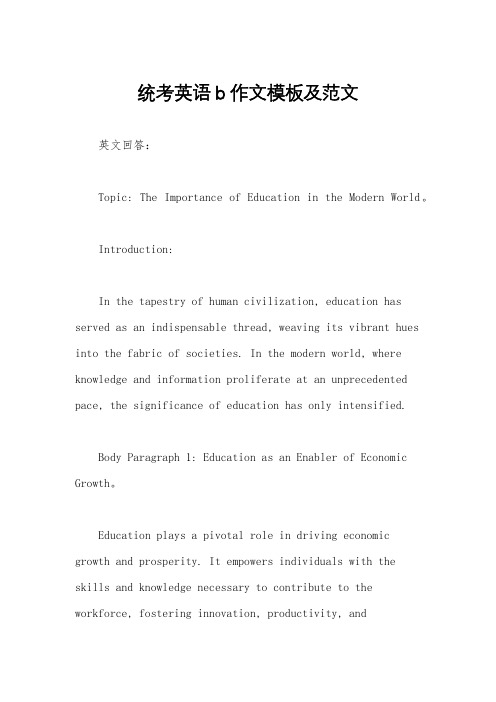
统考英语b作文模板及范文英文回答:Topic: The Importance of Education in the Modern World。
Introduction:In the tapestry of human civilization, education has served as an indispensable thread, weaving its vibrant hues into the fabric of societies. In the modern world, where knowledge and information proliferate at an unprecedented pace, the significance of education has only intensified.Body Paragraph 1: Education as an Enabler of Economic Growth。
Education plays a pivotal role in driving economic growth and prosperity. It empowers individuals with theskills and knowledge necessary to contribute to the workforce, fostering innovation, productivity, andentrepreneurship. By equipping people with the tools to succeed in the modern economy, education acts as a catalyst for job creation, increased wages, and reduced unemployment rates.Body Paragraph 2: Education as a Foundation for Social Progress。
统考英语(B) 交际用语

现在让我们转向另一个话题
-Yes, perfectly(完全的). Professor(教授).
4. -Excuse me, could you tell me the way to the British(英国的)Museum(博物馆)?
-You’d better not.
29. -I’m afraid I can’t go to your party, I have an important exam tomorrow.
-What a pity!
30. -Oh,dear!I’ve lost my new watch.
-What a pity!
-No, go ahead(向前的;领先的). 不,去吧
13. -Which(哪/那一个;哪/那一些) sweater(毛线衣,运动衫;) do you like better(较好的)?
-I can’t decide(决定,下决心).
14. -Medam,do all the buses go downtown(市中心的)?
60.---Can you go out with us for dinner this evening?
--- Thanks a lot, but I’m busy tonight.
61.— When you can't follow your teacher, what will you say?
-She is as tall as I am.
43. -Thank you for your great dinner. I really enjoyed it.
电大远程网络教育大学英语B统考题库写作
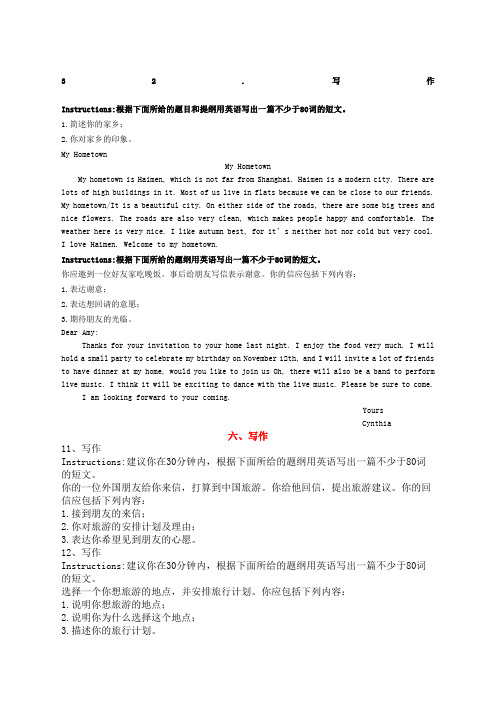
32.写作Instructions:根据下面所给的题目和提纲用英语写出一篇不少于80词的短文。
1.简述你的家乡;2.你对家乡的印象。
My HometownMy HometownMy hometown is Haimen, which is not far from Shanghai. Haimen is a modern city. There are lots of high buildings in it. Most of us live in flats because we can be close to our friends. My hometown/It is a beautiful city. On either side of the roads, there are some big trees and nice flowers. The roads are also very clean, which makes people happy and comfortable. The weather here is very nice. I like autumn best, for it’s neither hot nor cold but very cool.I love Haimen. Welcome to my hometown.Instructions:根据下面所给的题纲用英语写出一篇不少于80词的短文。
你应邀到一位好友家吃晚饭。
事后给朋友写信表示谢意。
你的信应包括下列内容:1.表达谢意;2.表达想回请的意愿;3.期待朋友的光临。
Dear Amy:Thanks for your invitation to your home last night. I enjoy the food very much. I will hold a small party to celebrate my birthday on November 12th, and I will invite a lot of friends to have dinner at my home, would you like to join us Oh, there will also be a band to perform live music. I think it will be exciting to dance with the live music. Please be sure to come.I am looking forward to your coming.YoursCynthia六、写作11、写作Instructions:建议你在30分钟内,根据下面所给的题纲用英语写出一篇不少于80词的短文。
统考英语b试题及答案

统考英语b试题及答案统考英语B试题及答案一、听力理解(共20分)1. 根据所听对话,选择正确答案。
A. 去图书馆B. 去电影院C. 去公园D. 去超市[答案] A2. 根据所听短文,回答以下问题。
Q: What is the main idea of the passage?A. The importance of environmental protection.B. The benefits of physical exercise.C. The effects of technology on daily life.D. The role of education in personal development. [答案] C二、阅读理解(共30分)1. 阅读以下短文,选择最佳答案。
Passage 1[文章内容略]A. The author is a teacher.B. The author is a student.C. The author is a journalist.D. The author's occupation is not mentioned. [答案] D2. 阅读以下短文,回答问题。
Passage 2[文章内容略]Q: What does the author suggest for improving communication skills?A. Reading more books.B. Traveling to different places.C. Participating in social activities.D. Watching more TV programs.[答案] C三、完形填空(共20分)[文章内容略]1. A. despiteB. becauseC. althoughD. since[答案] A2. A. successB. failureC. achievementD. accomplishment[答案] B四、语法填空(共10分)[文章内容略]1. The book _______ (write) by the famous author is very popular.[答案] written2. She _______ (not finish) her homework when her friend called her.[答案] hadn't finished五、翻译(共10分)1. 请将以下句子从中文翻译成英文。
统考英语b
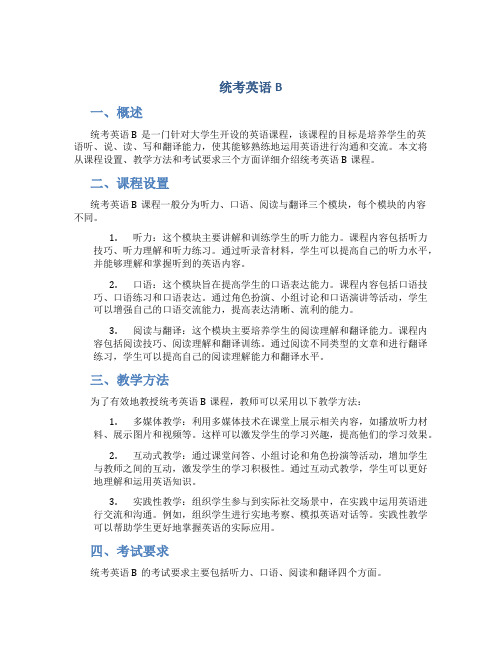
统考英语B一、概述统考英语B是一门针对大学生开设的英语课程,该课程的目标是培养学生的英语听、说、读、写和翻译能力,使其能够熟练地运用英语进行沟通和交流。
本文将从课程设置、教学方法和考试要求三个方面详细介绍统考英语B课程。
二、课程设置统考英语B课程一般分为听力、口语、阅读与翻译三个模块,每个模块的内容不同。
1.听力:这个模块主要讲解和训练学生的听力能力。
课程内容包括听力技巧、听力理解和听力练习。
通过听录音材料,学生可以提高自己的听力水平,并能够理解和掌握听到的英语内容。
2.口语:这个模块旨在提高学生的口语表达能力。
课程内容包括口语技巧、口语练习和口语表达。
通过角色扮演、小组讨论和口语演讲等活动,学生可以增强自己的口语交流能力,提高表达清晰、流利的能力。
3.阅读与翻译:这个模块主要培养学生的阅读理解和翻译能力。
课程内容包括阅读技巧、阅读理解和翻译训练。
通过阅读不同类型的文章和进行翻译练习,学生可以提高自己的阅读理解能力和翻译水平。
三、教学方法为了有效地教授统考英语B课程,教师可以采用以下教学方法:1.多媒体教学:利用多媒体技术在课堂上展示相关内容,如播放听力材料、展示图片和视频等。
这样可以激发学生的学习兴趣,提高他们的学习效果。
2.互动式教学:通过课堂问答、小组讨论和角色扮演等活动,增加学生与教师之间的互动,激发学生的学习积极性。
通过互动式教学,学生可以更好地理解和运用英语知识。
3.实践性教学:组织学生参与到实际社交场景中,在实践中运用英语进行交流和沟通。
例如,组织学生进行实地考察、模拟英语对话等。
实践性教学可以帮助学生更好地掌握英语的实际应用。
四、考试要求统考英语B的考试要求主要包括听力、口语、阅读和翻译四个方面。
1.听力:考试内容主要是听力材料和相关问题。
学生需要听录音,并根据所听内容回答问题。
考试旨在测试学生的听力理解和应对能力。
2.口语:考试内容包括个人演讲和口语交流。
学生需要准备一个主题演讲,并进行口语交流。
统考英语b级作文模板

统考英语b级作文模板英文回答:1. What are the advantages and disadvantages of studying abroad?Studying abroad provides students with numerousbenefits and challenges. Here are some of the key advantages and disadvantages:Advantages:Enhances Job Prospects: Studying abroad demonstrates a global perspective, cultural awareness, and adaptability, which are highly valued by employers in today's globalized job market.Personal Growth: Immersing oneself in a new culture challenges personal boundaries and fosters resilience, independence, and adaptability.Academic Enrichment: Studying abroad exposes studentsto different educational systems, enriches their knowledge base, and broadens their intellectual horizons.Cultural Immersion: Living and studying in a foreign country provides firsthand experience with different customs, beliefs, and lifestyles, fostering cultural sensitivity and understanding.Language Proficiency: Studying abroad offers the opportunity for intensive language immersion, improving fluency and communication skills in the target language.Disadvantages:Cost: Studying abroad can be expensive, including tuition, accommodation, travel, and living expenses, which can be a significant financial burden.Culture Shock: Adapting to a new culture can be challenging, leading to feelings of isolation, homesickness,and culture shock.Academic Adjustments: Students may need to adjust to different academic expectations, grading systems, and teaching styles, which can be challenging.Language Barrier: In non-native English-speaking countries, language barriers can hinder communication and understanding, both in and outside the classroom.Separation from Family and Friends: Living far away from family and friends can be emotionally difficult, especially during challenging times.2. What are the factors to consider when choosing a university to study abroad?When choosing a university to study abroad, it is important to consider several factors that align with individual preferences and goals:Academic Reputation: Research the university'sacademic standing, faculty expertise, and program rankings to ensure the quality of education and credibility of the institution.Location: Consider the country, city, and campus location that best suits personal interests, cultural preferences, and proximity to desired experiences.Cost and Financial Aid: Determine the total cost of attendance, including tuition, fees, accommodation, and living expenses. Explore potential financial aid options, such as scholarships, grants, and loans.Programs and Courses: Evaluate the availability and quality of programs and courses that align with academic interests and career aspirations.Campus Life and Culture: Learn about the campus environment, student organizations, extracurricular activities, and community involvement to ensure a vibrant and supportive atmosphere.Visa and Immigration Requirements: Research the visa and immigration requirements of the host country and apply well in advance to avoid any delays or complications.中文回答:1. 出国留学的利弊是什么?出国留学既给学生带来了许多好处,也带来了很多挑战。
统考英语b作文万能模板范文

统考英语b作文万能模板范文英文回答:Task 1: Letter of Complaint。
Dear Customer Service,。
I am writing to express my dissatisfaction with the recent purchase I made from your company. On [date], I ordered [product name] from your online store, order number [order number].Upon receiving the product, I was disappointed to find that it was defective. The [specific defect] renders the product unusable for its intended purpose. I have attached photos and/or videos of the defect for your reference.I have been a loyal customer of your company for [number] years and have always been satisfied with your products. I am extremely disappointed that this recentpurchase has fallen short of my expectations.I request that you take immediate action to resolve this issue. I would appreciate it if you could:Replace the defective product with a new, fully functional unit or。
全国大学英语B统考写作整理(含答案)

写作B5、写作Instructions:建议你在30分钟内,根据下面所给的题目和提纲用英语写出一篇不少于80词的短文。
Which is more important, Health or Wealth?1.介绍你对健康与财富之间关系的看法;2.简述你持有以上看法的理由。
Which is more important, Health or Wealth?Some people prefer wealth to health, holding that one can do nothing without money. In order to get more money they can do anything. However, other people regard health as more important, insisting that it is no use having a lot of money if health is lost.In my view, we should keep a balance between health and wealth. On the one hand, we must have enough money to keep healthy, because we cannot keep healthy without enough money. On the other hand, we should try to keep healthy when we work hard to make money, because we cannot work to earn money if we are not healthy.In a word, we shouldn’t achieve wealth at the cost of health.健康与财富一些人认为财富重于健康,他们认为没钱寸步难行。
大学英语B-作文15篇(大学英语B统考必看)
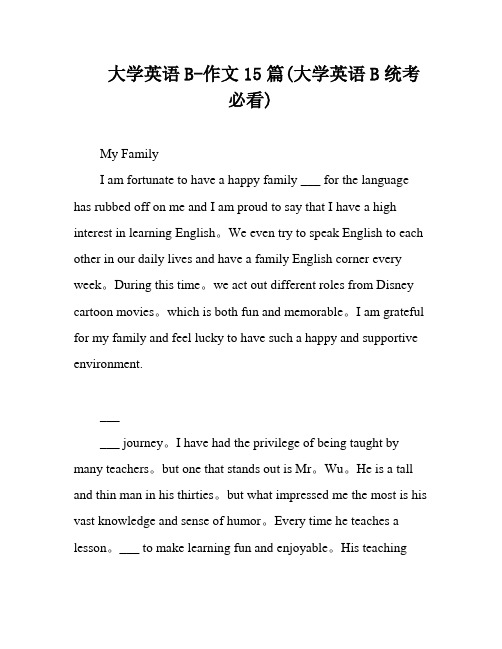
大学英语B-作文15篇(大学英语B统考必看)My FamilyI am fortunate to have a happy family ___ for the language has rubbed off on me and I am proud to say that I have a high interest in learning English。
We even try to speak English to each other in our daily lives and have a family English corner every week。
During this time。
we act out different roles from Disney cartoon movies。
which is both fun and memorable。
I am grateful for my family and feel lucky to have such a happy and supportive environment.______ journey。
I have had the privilege of being taught by many teachers。
but one that stands out is Mr。
Wu。
He is a tall and thin man in his thirties。
but what impressed me the most is his vast knowledge and sense of humor。
Every time he teaches a lesson。
___ to make learning fun and enjoyable。
His teachingstyle has left a deep n on me。
英语b级统考作文模板

英语b级统考作文模板英文回答:In the realm of education, standardized tests serve as important benchmarks to assess students' academic proficiency and provide a basis for comparison across different institutions and regions. Among the various standardized tests, the English B Assessment Exam holds a significant position in many countries, particularly in the context of second language learning and assessment. This comprehensive exam encompasses a wide range of skills, including reading, writing, listening, and speaking.The English B Assessment Exam is designed to evaluate students' ability to communicate effectively in written and spoken English. In the reading section, students are presented with a variety of texts, such as literary passages, news articles, and academic essays. They are expected to demonstrate their comprehension of the texts, analyze their structure, and identify key ideas andsupporting details. The writing section, on the other hand, assesses students' ability to produce coherent and well-organized essays, demonstrating their proficiency in grammar, vocabulary, and syntax.The listening section of the exam evaluates students' ability to understand spoken English. They are exposed to a range of audio recordings, including lectures, conversations, and interviews. Students are required to identify the main ideas, key points, and supporting arguments presented in the audio recordings. The speaking section provides an opportunity for students to demonstrate their fluency and communicative competence in English. They are given specific tasks, such as describing a topic, engaging in a conversation, or expressing their opinions.The English B Assessment Exam serves multiple purposes. Firstly, it provides a standardized measure of students' English proficiency, allowing for comparisons across different educational institutions and regions. This information can be used by schools, universities, and employers to make informed decisions regarding students'academic placement, admission, and employment opportunities. Secondly, the exam helps identify areas where students need additional support and reinforcement. By analyzingstudents' performance on different sections of the exam, educators can pinpoint specific areas of weakness andtailor their instruction accordingly.Furthermore, the English B Assessment Exam encourages students to develop a well-rounded set of English language skills. By preparing for the exam, students enhance their reading comprehension, writing fluency, listening comprehension, and speaking abilities. These skills are essential for success in both academic and professional settings, and they contribute to the overall development of students as communicators and global citizens.In conclusion, the English B Assessment Exam is a valuable tool for assessing students' English language proficiency and providing a basis for comparison across different institutions and regions. It encompasses a wide range of skills, including reading, writing, listening, and speaking, and it encourages students to develop a well-rounded set of English language abilities. The exam serves multiple purposes, including providing information for decision-making, identifying areas for improvement, and promoting the development of essential communication skills.中文回答:英语B级统考是一种重要的标准化考试,旨在评估学生的英语能力,并为跨不同机构和地区的比较提供依据。
全国高校网络教育大学英语统考(B)试题及答案
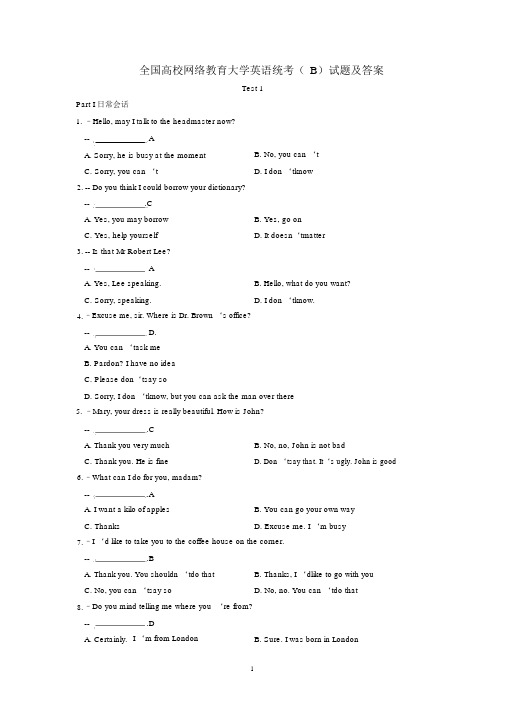
全国高校网络教育大学英语统考(B)试题及答案Test 1Part I 日常会话1. –Hello, may I talk to the headmaster now?--AA. Sorry, he is busy at the momentB. No, you can ‘tC. Sorry, you can ‘tD. I don ‘tknow2.-- Do you think I could borrow your dictionary?--.CA. Yes, you may borrowB. Yes, go onC. Yes, help yourselfD. It doesn‘tmatter3.-- Is that Mr Robert Lee?--AA. Yes, Lee speaking.B. Hello, what do you want?C. Sorry, speaking.D. I don ‘tknow.4.–Excuse me, sir. Where is Dr. Brown ‘s office?-- D.A. You can ‘task meB. Pardon? I have no ideaC. Please don‘tsay soD. Sorry, I don ‘tknow, but you can ask the man over there5. –Mary, your dress is really beautiful. How is John?--.CA. Thank you very muchB. No, no, John is not badC. Thank you. He is fineD. Don ‘tsay that. It‘s ugly. John is good6.–What can I do for you, madam?--.AA. I want a kilo of applesB. You can go your own wayC. ThanksD. Excuse me. I ‘m busy7.–I ‘d like to take you to the coffee house on the corner.--.BA. Thank you. You shouldn ‘tdo thatB. Thanks, I ‘dlike to go with youC. No, you can ‘tsay soD. No, no. You can ‘tdo that8.–Do you mind telling me where you‘re from?--.DA. Certainly.I ‘m from LondonB. Sure. I was born in LondonC. Not really, you can do itD. Certainly not. I ‘m from London9. –May I see the menu, please?--CA. That is the menu, sir.B. Yes, please go on.C. Here you are, sir.D. Of course, sir.10. –I was worried about chemistry, but Mr Brown gave me an A !--.BA. Don ‘tworry about itB. Congratulations! That ‘s a difficult courseC. Mr Brown is very goodD. Good luck to you!Part I I阅读理解Passage 1There are stories about two U.S. presidents, Andrew Jackson and Martin Van Buren, which attempt to explain the American English term OK. We don‘tknow if either story is true, but they are both interesting.The first explanation is based on the fact that President Jackson had very little education. In fact, he had difficulty reading and writing. When important papers came to Jackson, he tried to read them and then had his assistants explain what they said. If he approved of a paper, he would write ―all correct‖on it. The problem was that he didn ‘tknow how to spell, so what he really wrote was ―ol korekt ‖. After a while, he shortened that term to ―OK‖.The second explanation is based on the place where President Van Buren was born, Kinderhook, New York. Van Bruen‘s friends organized a club to help him become President. They called the club the Old Kinderhook Club, and anyone who supported Van Buren was called―OK‖.11.The author C .A. believes both of the storiesB. doesn‘tbelieve a word of the storiesC. is not sure whether the stories are trueD. is telling the stories just for fun12.According to the passage, President Jackson D.A. couldn ‘tdraw up any documents at allB. didn ‘tlike to read important papers by himselfC. often had his assistants sign documents for himD. wasn ‘tgood at reading, writing or spelling13.According to the first story, the term ―OK ‖C.A. was approved of by President JacksonB. was the title of some official documentsC. was first used by President JacksonD. was an old way to spell ―all correct ‖14.According to the second story, the term ―OK ‖D.A. was the short way to say ―Old Kinderhook Club‖B. meant the place where President Van Buren was bornC. was the name of Van Buren ‘s clubD. was used to call Van Buren ‘s supporters in the election15.According to the second story, the term ―OK ‖was first used B.A. by Van BurenB. in a presidential electionC. to organize the Old Kinderhook ClubD. by the members of the ―Old Kinderhook Club ‖Passage 2Although the United States covers so much land and the land produces far more food thanthe present population needs, its people are by now almost entirely an urban society. Less than a tenth of the people are engaged in agriculture and forestry( 林业 ), and most of the rest live in or around towns, small and large. Here the traditional picture is changing: every small town may stillbe very like other small towns, and the typical small town may represent a widely accepted view of the country, but most Americans do not live in small towns any more. Half the population now lives in some thirty metropolitan areas(large cities with their suburbs ) of more than a millionpeople each –a large proportion than in Germany or English, let alone France. The statistics( 统计 ) of urban and rural population should be treated with caution because so many people who live in areas classified as rural travel by car to work in a nearby town each day. As the rush to live out of town continues, rural areas within reach of towns are gradually filled with houses, so that it is hard to say at what moment a piece of country becomes a suburb. But more and more the typical American lives in a metropolitan rather than a small town environment.16.If now America has 250 million people, how many of them are engaged in agriculture andforestry?CA. About 25 million.B. More than 25 millionC. Less than 25 millionD. Less than 225 million17.Which of the following four countries has the smallest proportion of people living inmetropolitan areas?CA. the United States.B. GermanyC. France.D. England18.What‘s the meaning of the word ―metropolitan ‖in the middle of the passage?AA. Of a large city with its suburbs.B. Of small and large towns.C. Of urban areas.D. Of rural areas.19.According to the passage, what can we learn about small towns in the United States?BA.Most small towns become gradually crowded.B.Small towns are still similar to each other.C.As the traditional picture is changing, towns are different.D.Small towns are turning into large cities.20.Why is it hard to say when a piece of country becomes a suburb?CA.Because they are the same.B.Because the rush takes place too quickly.C.Because the process is gradual.D.Because more and more Americans live in metropolitan areas.Passage 3If we were asked exactly what we were doing a year ago, we should probably have to saythat we could not remember. But if we had kept a book and had written in it an account of whatwe did each day, we should be able to give an answer to the question.It is the same in history. Many things have been forgotten because we do not have any written account of them. Sometimes men did keep a record of the most important happenings in their country, but often it was destroyed by fire or in a war. Sometimes there was never any written record at all because the people of that time and place did not know how to write. For example, we know a good deal about the people who lived in China 4,000 years ago, because they could write and leave written records for those who lived after them. But we know almost nothing about the people who lived even 200 years ago in central Africa, because they had not learned to write.Sometimes, of course, even if the people cannot write, they may know something of the past. They have heard about it from older people, and often songs and dances and stories have been made about the most important happenings, and these have been sung and acted and told for many generations. For most people are proud to tell what their fathers did in the past. This we maycall ?remembered history ‘.Some of it has now been written down. It is not so exact or so valuable to us as written history is, because words are much more easily changed when used again and again in speech than when copied in writing. But where there are no written records, such spoken stories are often very helpful.21.Which of the following ideas is not suggested in the passage?DA.―Remembered history‖, compared with written history, is less reliable.B.Written records of the past play the most important role in our learning of the human history.C.A written account of our daily activities helps us to be able to answer many questions.D. Where there are no written records, there is no history.22.We know very little about the central Africa 200 years ago because D.A. there was nothing worth being written down at that timeB. the people there ignored the importance of keeping a recordC. the written records were perhaps destroyed by a fireD. the people there did not know how to write23.―Remembered history ‖refers to D.A. history based on a person ‘s imaginationB. stories of important happenings passed down from mouth to mouthC. songs and danced about the most important eventsD. both B and C24.―Remembered history ‖is regarded as valuable only when B.A. it is written downB. no written account is availableC. it proves to be trueD. people are interested in it25. The passage suggests that we could have learned much more about our past than we do now ifthe ancient people had A.A. kept a written record of every past eventB. not burnt their written records in warsC. told exact stories of the most important happeningsD. made more songs and dancesPart I I I语法与词汇选择题26. Jean did not have time to go to the concert last night because she wasbusy C for her examination.A. to prepareB. to be preparedC. preparingD. being prepared27. The computer doesn‘twork well. Something C wrong.A. can have goneB. should have goneC. must have goneD. ought to have gone28. Although Mary is satisfied with her success, she wonders C will happen to her privatelife.A. howB. whoC. whatD. that2 9. T h e c o n c er t us u a l l y t ak es p l ac e a t t he P eo p l e ‘s S q uar e, w i t ht h eaudience B on the ground.A. seatingB. seatedC. be seatingD. to seat30. If the whole program D beforehand, a great deal of time and money would have beenA. was not plannedB. were not plannedC. would not be plannedD. had not been planned31.Isn‘tit about the time you A to do morning exercises?A. beganB. beginC. should beginD. have begun32.I am very grateful to you for what you‘ve given me and D you have done for me.A. whichB. thatC. all whatD. all that33.It was not until she had arrived home B remembered her appointment with the doctor.A. when sheB. that sheC. and sheD. she34.Determined to A as if everything were normal, he responded with a kind of indifference.A. carry onB. account forC. bring upD. get through35.He C to arrange a loan through a finance company.A. triedB. succeededC. managedD. endeavored36.Jack is good, kind, hard working and intelligent., I can ‘tspeak too highly of him.A. As a resultB. In a wordC. By the wayD. On the contrary37.I going to the doctor , but I wish I hadn‘t.A. pick outB. make outC. give offD. put off38.Young children often can ‘t between TV programs and commercials.A. separateB. distinguishC. compareD. contrast39.The morning paper a story about demonstrations in New York and Washington D.C.A. carriedB. extendedC. broughtD. took40.And what we have got to is a disgrace.A. come up withB. catch up withC. put up withD. keep up withPart IV.完形填空You will find that college classes are very different from high school classes. You will have more work and responsibilities without being pushed as much.41, you will have more freedom –freedom to choose what to study, when to study, or42 to study. You will need to exercise maximum self-discipline. This is the hardest kind of discipline because it is self-imposed( 志愿的 ), and you have only yourself to43 . The decisions you make44 your study habits will be a45factor in your success, or lack of success in college.46, you will discover that your instructors47the ones you have had previously. They will expect you to48more48in your study habits and time management. Remember that much of your learning takes place outside the classroom. Your instructor willgive you additional help outside of class if there is evidence that you are putting maximum effortinto course.49 your abilities and skill mastery, you will need to manage your time effectively in order to succeed in college. A schedule 50efficient use of time will enable you to include both work and play. When you get a job, you will soon discover that you do not work only when you wish and as you wish. (221 words)41.A. On the other hand B. On the one handC. NeverthelessD. Therefore42.A. if B. whether C. why D. who43.A. turn to B. answer to C. respond to D. act as44.A. of B. to C. towards D. concerning45.A. determining B. demanding C. deciding D. depending46.A. However B. Nevertheless C. In addition D. Except that47.A. differ from B. are similar to C. differ in D. are alike48.A. take ⋯ part B. throw ⋯ yourself C. plunge ⋯ yourself D. take⋯ initiative49.A. In spite of B. ConcerningC. Regardless ofD. On the condition of50.A. related to B. carried on C. relied on D. based onTest 2Part I日常会话1. –Would you like to have dinner with us this evening?--.A. OK, but I have to go to a meeting nowB. No, I can ‘tC.I ‘dlove to, but this evening I have to go to the airport to meet my parentsD.I don ‘tknow2. –Hi, is Mary there, please?--A. Hold on. I ‘llget her.C. Yes, she lives here.3. –Please help yourself to the fish.--.A. Thanks, but fish doesn ‘tagree with meB. Sorry, I ca n‘thelpC. I don ‘tlike fish B. No, she isn ‘there.D. Yes, what do you want?D. No, I can ‘t4.–Hurry up, please, or I ‘llbe late.--.A. Sorry sir, but the traffic is thick nowB. Well, it ‘s alright, sirC. How can you say that, sir?D. Oh, we are going the right way5.–Excuse me, but can you tell me the way to the airport?--.A. Don ‘task thatB. Sorry, I ‘m a stranger hereC. No, I can ‘tsay thatD. No, you ‘re driving too fast6.–How about going to the cinema tonight, Jane?--.A. I don ‘tthink soB.I ‘m sorry. I have to drive my mother home tonightC.Never mindD.Take it easy7.–Are you ready to order desert, please?--.A. Yes, pleaseB. Please don‘torder itC. No, don ‘tmention itD. Yes, I ‘d like to have some chocolate cake8.–Did Tom tell you to water the flowers?--.A. No. And so did IB. No. And neither did IC. He did. And so I didD. He did. And so do I9.–Shall we sit up here on the grass or down there near the water?--.A.I ‘drather stay here if you don ‘tmindB.Sorry, I don ‘tlike neitherC.Certainly, why not?D.Yes, we like these two places10.–Would you mind changing seats with me?--.A. Yes, you canB. Of course, I like toC. No, I don ‘tmindD. Certainly, please doPart I I阅读理解Passage 1When Mrs. Joseph Groeger died recently in Vienna, Austria, people asked the question, ―Why did she live to be 107?‖Answers were provided by a survey conducted among 148Viennese men and women who had reached the age of 100. Somewhat surprising was the fact that the majority had lived most of their lives in cities. In spite of the city ‘s image as an unhealthy place, city living often provides benefits that country living can lack. One factor seems to be important to the longevity of those interviewed.This factor is exercise. In the cities it is often faster to walk short distances than to wait for a bus. Even taking public transportation often requires some walking. Smaller apartment houses have no elevators, and so people must climb stairs. City people can usually walk to local supermarkets. Since parking spaces are hard to find, there is often no alternative to walking.On the other hand, those who live in the country and suburbs do not have to walk every day. In fact, the opposite is often true. To go to school, work, or almost anywhere else, they must ridein cars.11. The Vienna survey may help to explain.A. the complaints of people in apartment housesB. the cause of Mrs. Groeger ‘s deathC. the longevity of people like Mrs. GroegerD. the image of cities in general12. The purpose of the second paragraph is to list some.A. benefits of walkingB. occasions for walking in city lifeC. comments made by city peopleD. problems of city living13. To reach the third floor of a building, it would probably be most healthful.A. to take the elevatorB. to walk up the stairsC. to ride in a carD. to find an alternative to walking14. People who live in the country probably do more driving than walking because.A. they don ‘tlive near business areasB. they don ‘tneed the exerciseC. they never have parking problemsD. they can ‘tafford to take the bus15. A conclusion that can be drawn from this passage is that.A. air pollution is not seriousB. anyone can live to be 107C. country people should move to the cityD. walking is healthful exercisePassage 2For any Englishman, there can never be any discussion as to who is the world ‘s greatest dramatist. Only one name can possibly suggest itself to him: that of William Shakespeare. EveryEnglishman has some knowledge, however slight, of the work of our greatest writer. All of us use words, phrases and quotations from Shakespeare ‘s writings that have become part of the common property of the English-speaking people. Most of the time we are probably unaware of the source of the words we used, rather like the old lady who was taken to see a performance of Hamlet and complained that it was full of well- known proverbs and quotations.Shakespeare, more perhaps than any other writer, makes full use of the great resources of the English language. Most of us use about five thousand words in our normal use of English; Shakespeare in his works used about twenty-five thousand.There is probably no better way for a foreigner to appreciate the richness and variety of the English language than by studying the various ways in which Shakespeare used it. Such a study is well worth the effort (it is not, of course, recommended to beginners) even though some aspects of English usage, and the meaning of many words, have changed since Shakespeare‘s day.16. English people.A. have never discussed who is the world ‘s greatest dramatistB. never discuss any issue concerning the world ‘s greatest dramatistC. are sure who is the world ‘s greatest dramatistD. do not care who is the world ‘s greatest dramatist17. Every Englishman knows.A. more or less about ShakespeareB. Shakespeare, but only slightlyC. all Shakespeare‘s writingsD. only the name of the greatest English writer18.Which of the following is true?A. We use all the words, phrases and quotations from Shakespeare‘s writings.B.Shakespeare‘s writings have become the property of those who are learning to speakEnglish.C.It is likely to be true that people often do not know the origins of the words they use.D.All the words people use are taken from the writings of Shakespeare.19.What does the word ―proverb ‖mean?A. Familiar sayings.B. Shakespeare‘s plays.C. Complaints.D. Actors and actresses.20.Why is it worthwhile to study the various ways in which Shakespeare used English?A. English words have changed a lot since Shakespeare ‘s timeB.By doing so one can be fully aware of the richness of the English language.C.English words are now being used in the same way as in Shakespeare‘s timeD.Beginners may have difficulty learning some aspects of English usage.Passage 3Trees are useful to man in three very important ways: they provide him wood and other products; they give him shade; and they help to prevent drought ( 干旱 ) and floods.Unfortunately, in many parts of the world, man has not realized that the third of these services is the most important. In his eagerness to draw quick profit from the trees, he has cut them down in large numbers.Two thousand years ago, a rich and powerful country cut down its trees to build warships, with which to gain itself an empire. It gained the empire but, without its trees, its soil became bare and poor. When the empire fell to pieces, the country found itself faced by floods and starvation.Even where a government realizes the importance of a plentiful supply of trees, it is difficult sometimes to make the people realize this. They cut down the trees but are too careless to plant and look after new trees. So, unless the government has a good system of control, or can educate the people, the forests slowly disappear.This does not only mean that there will be fewer trees. The results are even more serious: for where there are trees, their roots break the soil up, allowing the rain to sink in, and also bind the soil. This prevents the soil from being washed away. But where there are no trees, the rain falls on hard ground and flows away on the surface, and this causes floods and the rain carries away the rich topsoil in which crops grow. When all the topsoil is gone, nothing remains but worthless desert.21.Trees are useful to man mainly in three ways,the most important of which is that theycan.A. keep him from the hot sunshineB. enable him to build warshipsC. make him draw quick profit from themD. protect him from droughts and floods22.It ‘s a great pity that.A. man is only interested in building empiresB. man is eager to profit from treesC. man hasn‘trealized the importance of trees to himD. man hasn‘tfound out that he has lost all trees23.Sooner or later the forests will disappear.A. unless a country has a plenty supply of treesB. unless people stop cutting down their treesC. unless all people are taught the importance of planting treesD. unless the government punishes those who cut trees instead of planting them24.The word ―bind ‖in Paragraph 5 means ―‖.A. to wash awayB. to make wetC. to make stay togetherD. to improve25.When there is a heavy rain, trees can help to prevent floods, as they can.A. keep rain from falling down to soft groundB. cause the soil to allow rainwater to sink inC. prevent the soil from being washed awayD. make the topsoil stick togetherPart I I I语法与词汇选择题26.TOEFL is a test for students native language is not English.A. thatB. of whomC. whoseD. which27.He told me how he had given me shelter and protection without which I of hunger.A. would be diedB. would dieC. would have diedD. will die28.This article deals with the natural phenomenon which most interesting to everyone.A. areB. isC. they areD. it is29.He studied hard in his youth,contributed to his great success in later life.A. thatB. itC. whatD. which30.The population of many Alaskan cities has doubled in the past three years.A. large thanB. as great asC. more thanD. as many as31.He‘s determined to finish the job long it takes.A. no matterB. howeverC. whereverD. whatever32.Hardly ever get a good job these days without a good education.A. people mightB. people canC. do peopleD. have people33.Nowhere else in the world more attractive scenery than in Switzerland.A. you can findB. is foundC. can you findD. has been found34.Children learn best by studying at their own.A. rateB. speedC. paceD. growth35.The committee is due to its report by the end of this year.A. releaseB. relieveC. relateD. retain36.She‘s an only child, but they didn ‘treally her.A. hurtB. damageC. spoilD. harm37.His parents him the opportunity to go to university.A. ignoredB. neglectedC. refusedD. denied38.all our efforts to save the school, the authorities decided to close it.A. As forB. BesidesC. ExceptD. Despite39. For a successful business, friendly and staff are essential.A. sufficientB. effectiveC. efficientD. respective40. To their new shampoo, they are selling it at half price for a month.A. progressB. proceedC. promoteD. proposePart IV.完形填空th He has been proclaimed ―the finest mind alive ‖, ―the greatest genius of the late 20century ‖, and ―Einstein ‘s heir(继承人)‖. Known to millions,41 , for his book A Brief History of Time(《时间简史》 ),Stephen Hawking is a star scientist in more ways than one. His gift42revealing the mysteries of the universe in a style that non-scientists can enjoy43Hawking an instant celebrity( 名人 )and his book a bestseller in both Britain and America. It has44 in the Guinness Book of Records for spending 184 weeks in The Sunday Times―top-ten ‖lists, and has sold more than five million copies worldwide---virtually unheard-of success for a science book.How did all this happen? How has a man45 is almost completely paralyzed (瘫痪 )andunable to speak46through a computer overcome these 47obstacles and achieved far more than most people ever dream of?Hawking says: ―I soon realized that the rest of the world won‘twant to know you if you‘rebitter or angry. You have to be48if you ‘re to get much sympathy or help.‖He goes on:―Nowadays, muscle power is obsolete (无用 ). What we need49mind power---and disable people are50good at that50anyone else.‖(250words)41.A. far and wide B. by far C. far and away D. so far42.A. of B. to C. for D. at43.A. is made B. has been made C. was made D. made44.A. earned a place B. achieved a fame C. made a name D. gained reputation45.A. whose B. who C. where D. which46.A. besides B. despite C. except D. aside from47.A. difficult B. incredible C. very D. surprising48.A. negative B. positive C. sensitive D. aggressive49.A. is B. is to C. are D. are to50.A. not so ⋯as B. as⋯as C. the same⋯as D. so⋯ thanTest 3Part I日常会话1.–Oh, sorry to bother you.--.A. That ‘s okayB. No, you can ‘tC. That ‘s goodD. Oh, I don ‘tknow2.–Good morning, Dr Johnson ‘s office. Can I help you?--.A. Speaking, pleaseB. I ‘dlike to make an appointment, pleaseC. Yes, go onD. No, you can ‘t3.–We are going to have a dancing party tonight. Would you like to join us?--.A.I ‘m afraid not. Because I have an appointment with my dentist tonightB.Of course not. I have no ideaC.No, I can ‘tD.That ‘s all set4.–Excuse me. I don ‘twant to interrupt you but ⋯--.A. Can I help you?B. Certainly, how dare you?C. It ‘s quite all rightD. Yes, you did5.–You have lovely children.--.A. No, no, no. They are notB. Oh, no, noC. You ‘re talking too muchD. Thanks6. Can I help you with your suitcase?--.A. I have no ideaB. No, no. I can carry it myselfC. That ‘s a good ideaD. Thank you. I can manage myself7. –Can you come over for dinner with us?--.A.I ‘dlike to but I have a meeting tonightB.It doesn ‘tmatterC.No, I don ‘tlikeD.Oh, that sounds well8.–Good night and thanks again.--.A. You can ‘tsay thatB. No, no. It ‘s what I can doC. How can you say that?D. Good night9. –Oh, I ‘m sorry. But I promise I ‘llbe careful next time.--.A. I t ‘s nothing at allB. Oh, never mind. It doesn ‘tmatterC. Thank youD. There are no questions10. –Could I use your dictionary for a moment?--.A. It ‘s wellB. It doesn ‘tmatterC. By all meansD. I have no ideaPart I I阅读理解Passage 1Dr. Harvey Gates, the noted scientist, might never have discovered the Kamron lizard( 蜥蜴)in Blovia, if it had not been for a childhood accident. As a boy, he was determined to become a baseball player, but when he broke his arm in practice at the age of fourteen and was forced to stay off the playing field for a while, he took notice of the natural world around him and liked what he saw.After he had recovered from his injury, he caught a squirrel and raised it as a pet. Soon he was bringing home snakes and other creatures from the woods near his school.In 1962, he entered Blakeford College and majored in biology. By 1966 he had received his Bachelor of Science degree and two years later at Drysdale University, he received his Doctor of Science degree. It was while he was doing field research for his doctoral studies in SouthAmerica in 1967 that he discovered and named the Kamron lizard. This animal was different from others of its kind in that it had only four toes on its front feet. In other respects, it was similar to others of the same family. It could change its color and go for long periods without food.11.Of the four statements, which one best indicates the author ‘s idea?A.Dr. Gates is a scientist who can always attract the public attention to his research.B.Dr. Gates is a very famous scientist, though he wanted to be a sportsman at first.C.Dr. Gates is a scientist who always carries a notebook with him wherever he goes.D.Dr. Gates is a very popular for his determination to become a baseball player.12. In the first paragraph of the passage, the phrase ―in practice ‖means ―‖.A. while doing some practical workB. while studying animalsC. while making up his mind to become a baseball playerD. while playing baseball13. In the second paragraph, the word ―creatures‖can best be replaced by ―‖.A. peopleB. thingsC. animalsD. living things14. It was that Dr. Gates discovered the Kamron lizard.A. after he had graduated from Drysdale UniverstityB. right after he had finished his study for the doctor‘s degreeC. after he had received his highest degree。
大学英语B统考技巧及大纲

大学英语B考试大纲及考试技巧[最新版]试点高校网络教育部分公共基础课全国统一考试,旨在遵循网络教育应用型人才的培养目标,针对从业人员继续教育的特点,重在检验学生掌握英语基础知识的水平及应用能力,全面提高现代远程高等学历教育的教学质量。
“大学英语”课程是现代远程教育试点高校网络教育实行全国统一考试的部分公共基础课之一。
该课程的考试是一种基础水平检测性考试,考试合格者应达到与成人高等教育本科相应的大学英语课程要求的水平。
考试对象教育部批准的现代远程教育试点高校网络教育学院和中央广播电视大学“人才培养模式改革和开放教育试点”项目中自2004年3月1日(含3月1日)以后入学的本科层次学历教育的学生,应参加网络教育部分公共基础课全国统一考试。
“大学英语(B)”考试大纲适用于除英语类和艺术类专业以外的其他专业高中起点与专科起点本科学生。
考试目标本考试旨在考查现代远程教育所有专业(除英语类和艺术类专业)的学生掌握英语基础知识的水平及应用能力。
考生应掌握基本的英语语法知识和词汇,具备运用不同语言技能进行交际的基本能力。
考试内容与要求【语法】考生应较好地掌握基本的英语语法知识,并能在交际中较正确地加以运用。
【词汇】考生应认知3000个单词,并熟练掌握其中的1 800个单词及其基本的搭配。
【交际能力】考生应掌握日常生活常见情景中的基本交际用语。
【阅读】考生应能基本读懂与日常生活和社会活动相关的不同类型的文字材料,阅读速度为每分钟50个单词。
考生应能:1.理解主旨要义;2.理解文中具体信息;3.根据上下文推测生词词义;4.进行有关的判断、推理和引申,理解作者的意图、观点或态度。
【翻译】考生应能在规定时间内将难度适中的英文句子翻译成中文。
考生应能:1. 对英语原文有准确的理解;2. 做到译文通顺、达意。
【写作】考生应能在规定时间内写出长度不少于80词的短文。
考生应能:1.用较正确的语法、词汇、拼写、标点进行表达;2.基本做到内容切题,条理清楚;3.根据不同的写作目的进行有针对性的写作。
《大学英语B》统考重点精讲2-阅读理解

《大学英语B》统考重点精讲2-阅读理解Passage 1There are stories about two U. S. presidents, Andrew Jackson and Martin Van Buren, which attempt to explain the American English term OK. We don't know if either story is true, but they are both interesting.这是关于两个美国总统:安德鲁. 杰费逊和马丁. 范布郎的故事,这个故事解释了美国英语短语Ok.我们不知道这两个故事是否是真的,但是它们都很有趣.The first explanation is based on the fact that President Jackson had very little education. In fact, he had difficulty reading and writing. When important papers came to Jackson, he tried to read them and then had his assistants explain what they said. If he approved of a paper, he would write "all correct" on it. The problem was that he didn't know how to spell, so what he really wrote was "ol korekt". After a while, he shortened that term to "OK".第一个故事是根据杰费逊受过很少的教育的事实而来的.事实上, 杰费逊总统在阅读和写作方面都有困难.当有重要文件拿给杰费逊时,他设法读而且会让他的助手们解释.如果他同意这份文件,他会写上”都正确”.问题是他不知道如何拼写,因此他写的实际是”ol korekt”.不久,他就把它缩短为OK.The second explanation is based on the place where President Van Buren was born, Kinderhook, New York. Van Buren's friends organized a club to help him become President. They called the club the Old Kinderhook Club, and anyone who supported Van Buren was called "OK".第二个故事是关于范布郎总统的出生地纽约的Kinderhook而来的. 范布郎总统的朋友们组织了一个俱乐部来支持他竞选总统.这个俱乐部叫”the Old Kinderhook Club”,而且每个支持范布郎总统的人都叫OK.31. The author _________.这个作者不太确定故事的真实性.A. believes both of the storiesB. doesn't believe a word of the storiesC. is not sure whether the stories are trueD. is telling the stories just for fun32. According to the passage, President Jackson _______.根据短文, 杰费逊总统不擅长阅读,写作或拼写.A. couldn't draw up any documents at allB. didn't like to read important papers by himselfC. Often had his assistants sign documents for himD. wasn't good at reading, writing or spelling33. According to the first story, the term "OK" _______.根据第一个故事,短语OK首先是由杰费逊总统使用的.A. was approved of by President JacksonB. was the title of some official documentsC. was first used by President JacksonD. was an old way to spell "all correct"34. According to the second story, the term "OK" _______.根据第二个故事,短语OK是用来叫支持范布郎竞选的人.A. was the short way to say "Old Kinderhook Club"B. meant the place where President Van Buren was bornC. was the name of Van Buren's clubD. was used to call Van Buren's supporters in the election35. According to the second story, the term "OK" was first used _______.根据第二个故事,短语OK最先用于总统选举。
统考《大学英语B》高频作文范文16-20
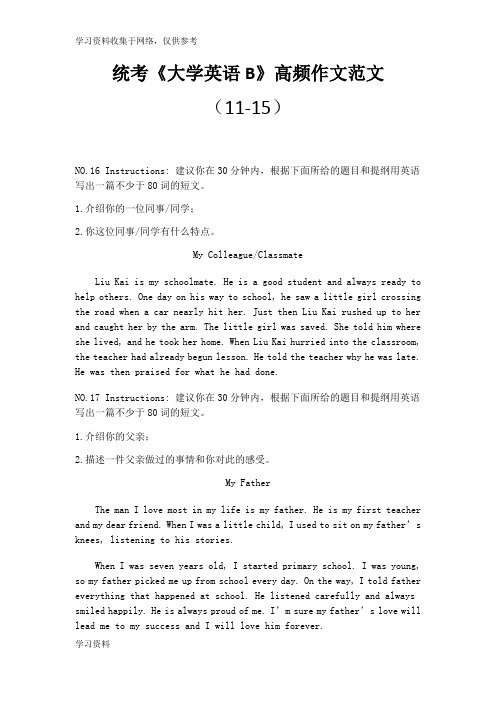
统考《大学英语B》高频作文范文(11-15)NO.16 Instructions: 建议你在30分钟内,根据下面所给的题目和提纲用英语写出一篇不少于80词的短文。
1.介绍你的一位同事/同学;2.你这位同事/同学有什么特点。
My Colleague/ClassmateLiu Kai is my schoolmate. He is a good student and always ready to help others. One day on his way to school, he saw a little girl crossing the road when a car nearly hit her. Just then Liu Kai rushed up to her and caught her by the arm. The little girl was saved. She told him where she lived, and he took her home. When Liu Kai hurried into the classroom, the teacher had already begun lesson. He told the teacher why he was late. He was then praised for what he had done.NO.17 Instructions: 建议你在30分钟内,根据下面所给的题目和提纲用英语写出一篇不少于80词的短文。
1.介绍你的父亲;2.描述一件父亲做过的事情和你对此的感受。
My FatherThe man I love most in my life is my father. He is my first teacher and my dear friend. When I was a little child, I used to sit on my father’s knees, listening to his stories.When I was seven years old, I started primary school. I was young, so my father picked me up from school every day. On the way, I told father everything that happened at school. He listened carefully and always smiled happily. He is always proud of me. I’m sure my father’s love will lead me to my success and I will love him forever.NO.18 Instructions: 建议你在30分钟内,根据下面所给的题目和提纲用英语写出一篇不少于80词的短文。
统考英语(B) 词汇和结构

23. Bob said that it is easy (for him to be on time).
24.(If he had worked hard), he would have been the top student in the class.
45. He waited and waited and at last a gentleman(in a black suit)came forward.
46.I tried to put(through)a telephone call to him, but his line was always busy.
17.The bus arrived late(because of)the heavy snow.
18.The cost is(too much)for me; I won’t go this way any longer.
19.The thief admitted (stealing)gold rings in the store.
67.Tom, what did you do with my documents? I have never seen such a(mess) and disorder!
68.If she wants to stay thin, she must make a (change) in her diet.
统考英语(B) 词汇和结构
1. You should (save up) some money instead of spending it all.
英语统考B介绍

完型填空题型:五选五 每篇5题,每题设5个选项, 5题选项
相同
e.g: A) for B) waiting C) on D) if E) to
容易得分的题型
1. 交际用语 (15%) 2. 词汇与结构 (10%) 3. 翻译 (20%) 4. 写作 (15%)
争取分数的题型
1. 阅读理解 (30%) 其中一篇一定是统考蓝皮书18篇阅读 中的。
2. 完型填空 (10%)
考点 日常情景 交际能力
分值 15
Ⅱ
阅读理解
2篇短文,每 篇5题
判断正误+单 理解主旨 项选择 具体信息
20
Ⅲ
词汇与结 构
5个单句
Ⅳ 完型填空 1篇短文
Ⅴ 英译汉 6个单句
单项选择 5选5 翻译
词汇语法 10
词汇篇、章句知法识、15 短句翻译 30
Ⅵ 写作
1篇作文
命题作文 短文写作 10
统考阅读题型:判断正误 每篇5题,每题设2个选项 e.g: A) T B) F
英语统考B级介绍
统考介绍
• 毕业必须条件(免考政策请咨询专业教务 )
• 分为A、B、C级,大部分同学考B级 • 国家考试,每年固定3次(4、9、12月) • 考前2个月左右网上报名、缴费、打印准考
证 • 可以视个人情况同时报考2门或一次考1门 • 90分钟,机考,题库随机组卷 • 考后2个 月左右查分,分为“合格”、“
不合格”,可申请分数复议
关于统考改革
• 2014年起引入新大纲 • 2014年考3次:4、9月老题;12月新题 • 2015年以后,每年3次全部新大纲 • 改革主要以题型微调为主,难度保持不变
1)统考介绍(老题型)
- 1、下载文档前请自行甄别文档内容的完整性,平台不提供额外的编辑、内容补充、找答案等附加服务。
- 2、"仅部分预览"的文档,不可在线预览部分如存在完整性等问题,可反馈申请退款(可完整预览的文档不适用该条件!)。
- 3、如文档侵犯您的权益,请联系客服反馈,我们会尽快为您处理(人工客服工作时间:9:00-18:30)。
20
10
词汇、句法、15 篇章知识 短句翻译 短文写作 30 10
统考阅读题型:判断正误 每篇5题,每题设2个选项 e.g: A) T B) F
完型填空题型:五选五 每篇5题,每题设5个选项, 5题选项 相同 e.g: A) for B) waiting C) on D) if E) to
容易得分的题型
关于统考改革
• • • • 2014年起引入新大纲 2014年考3次:4、9月老题;12月新题 2015年以后,每年3次全部新大纲 改革主要以题型微调为主,难度保持不变
1)统考介绍(老题型)
部分 项目 内容 题型 考点 分值
Ⅰ
Ⅱ Ⅲ Ⅳ
日常情景 交际能力 判断正误+单 理解主旨 阅读理解 2篇短文,每 篇5题 项选择 具体信息 词汇与结 5个单句 单项选择 词汇语法 构
1. 交际用语 (15%) 2. 词汇与结构 (10%) 3. 翻译 (20%) 4. 理解 (30%) 其中一篇一定是统考蓝皮书18篇阅读 中的。 2. 完型填空 (10%)
英语统考B级介绍
统考介绍
• 毕业必须条件(免考政策请咨询专业教务 ) • 分为A、B、C级,大部分同学考B级 • 国家考试,每年固定3次(4、9、12月) • 考前2个月左右网上报名、缴费、打印准考 证 • 可以视个人情况同时报考2门或一次考1门 • 90分钟,机考,题库随机组卷 • 考后2个 月左右查分,分为“合格”、“ 不合格”,可申请分数复议
交际英语 5个短对话
单项选择
15
30 10
完型填空 1篇短文
单项选择
词汇、句法、10 篇章知识
Ⅴ
Ⅵ
英译汉
写作
4个单句
1篇作文
翻译
命题作文
短句翻译
短文写作
20
15
新题型
部分
Ⅰ
项目
内容
题型
单项选择
考点
日常情景 交际能力
分值
15
交际英语 5个短对话
Ⅱ
Ⅲ Ⅳ Ⅴ Ⅵ
判断正误+单 理解主旨 阅读理解 2篇短文,每 篇5题 项选择 具体信息 词汇与结 5个单句 构 完型填空 1篇短文 英译汉 写作 6个单句 1篇作文 单项选择 5选5 翻译 命题作文 词汇语法
